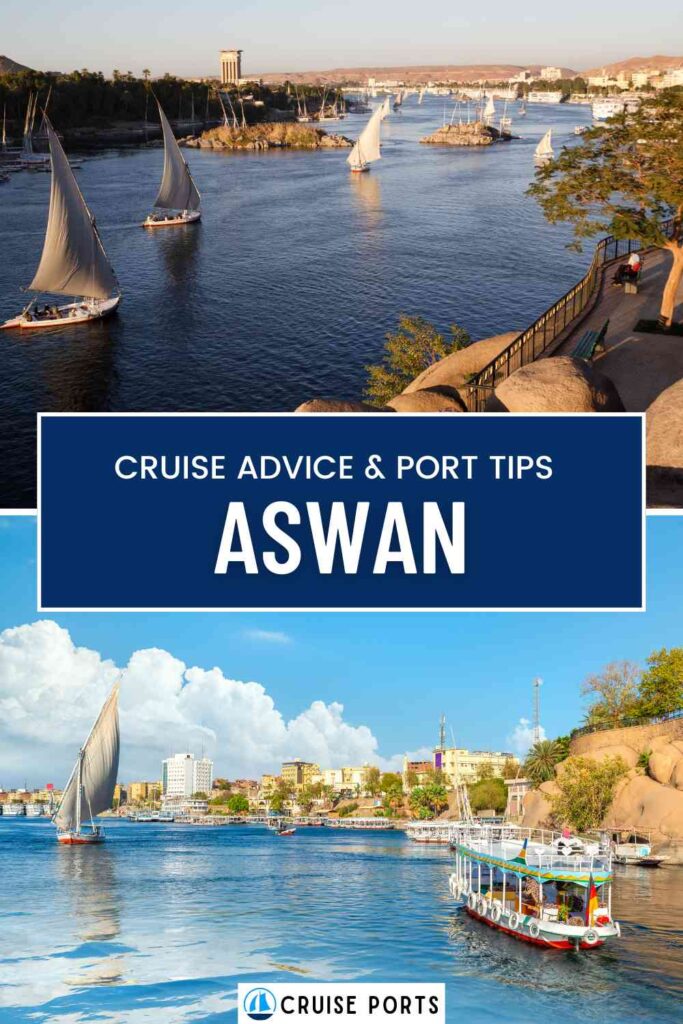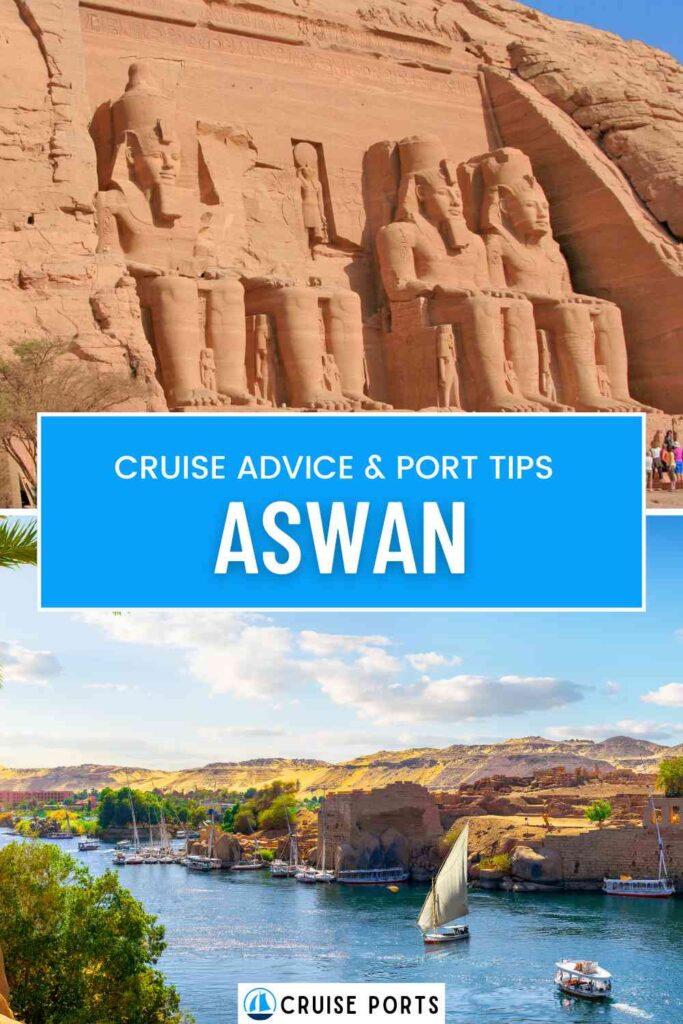Aswan’s serene location along the Nile makes it a top destination for travelers seeking a fusion of ancient history, natural wonders, and cultural immersion.
This guide unveils the best of Aswan’s cruise port and beyond, from breathtaking temples to timeless local traditions, for an extraordinary Egyptian adventure.
Why Visit Aswan?
Aswan sits at the crossroads of rich Egyptian history and remarkable natural scenery.
It’s an African cruise city where the golden deserts meet the shimmering Nile, and where millennia-old temples merge into the rhythms of modern life.
The moment you arrive, you’ll sense the tranquil energy: feluccas (traditional sailboats) glide across the river, local artisans display their intricate handicrafts in bustling souks, and the desert sun bathes ancient monuments in a warm glow.
- For history buffs, it’s a living museum of Pharaonic, Nubian, and Greco-Roman influences.
- For nature lovers, it’s a haven of palm-fringed islands and mesmerizing sunrises.
- For cultural explorers, Aswan offers a unique window into traditional Nubian heritage, complete with colorful architecture and time-honored storytelling traditions.
If you’re cruising along the Nile, Aswan is more than just a pit stop—it’s an invitation to slow down, soak in the atmosphere, and delve into an Egypt that feels both ancient and timeless.
This guide will help you discover the city’s highlights, hidden gems, and practical tips for making your stay extraordinary.
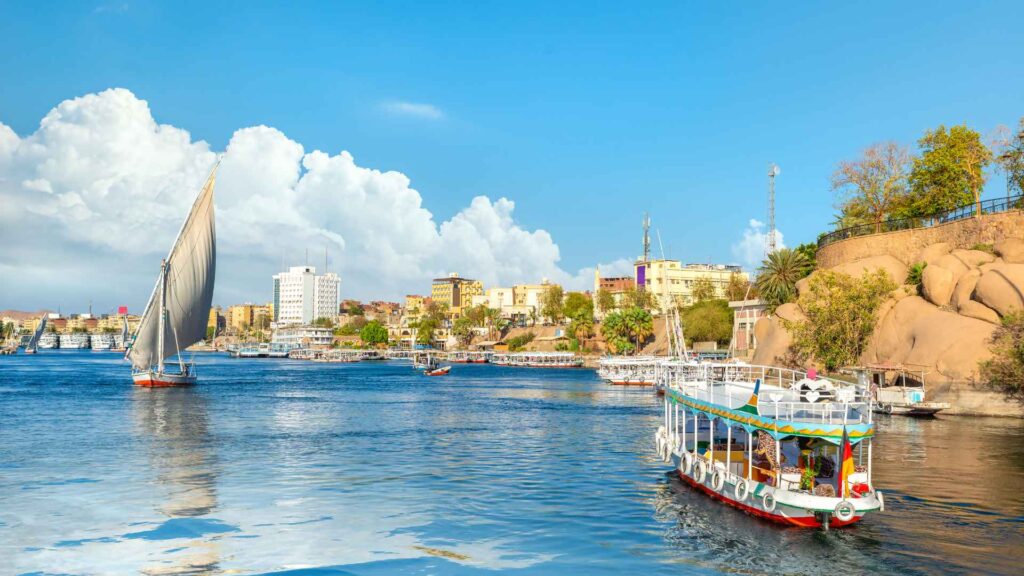
Arriving at Aswan (Nile) Cruise Port
Arriving in Aswan by cruise is often the grand finale (or the exciting start) of a Nile voyage from Luxor or Cairo.
Ships typically dock near the center of town, making it convenient for travelers to step ashore and explore.
Transportation Options from the Port
- Walking: Many key sights and the main souk are within walking distance of where most Nile cruise ships moor.
- Taxis: Readily available and relatively inexpensive. Always negotiate the fare upfront or insist on the meter if possible.
- Felucca: For nearby visits, consider hiring a felucca to cross the river or reach various islands.
- Ride-Hailing Apps: In some cases, ride-hailing apps are operational in Aswan, offering a convenient alternative to traditional taxis.
Once you disembark, you’ll find port staff, guides, and locals offering tours. If you prefer an independent adventure, it’s easy to explore on your own—just remember to follow local customs, stay hydrated, and plan your day around the heat.
Cruise Port Facilities
While Aswan’s Nile cruise docking stations are not as large or sophisticated as oceanic ports, they offer basic amenities to ensure a comfortable arrival.
You’ll typically find:
- Reception Areas: With a tourist information desk or a local representative to answer quick queries.
- Souvenir Shops: Selling everything from postcards and magnets to alabaster statues and papyrus scrolls.
- Local Vendors: Some might offer snacks, fresh juices, or souvenirs right by the docking area.
- Restrooms: Located on or near the dock, though availability and cleanliness can vary.
Most cruise ships themselves also boast amenities such as onboard restaurants, lounge areas, pools, and small shops.
For a deeper dive into local commerce and culture, you’ll definitely want to wander into town.
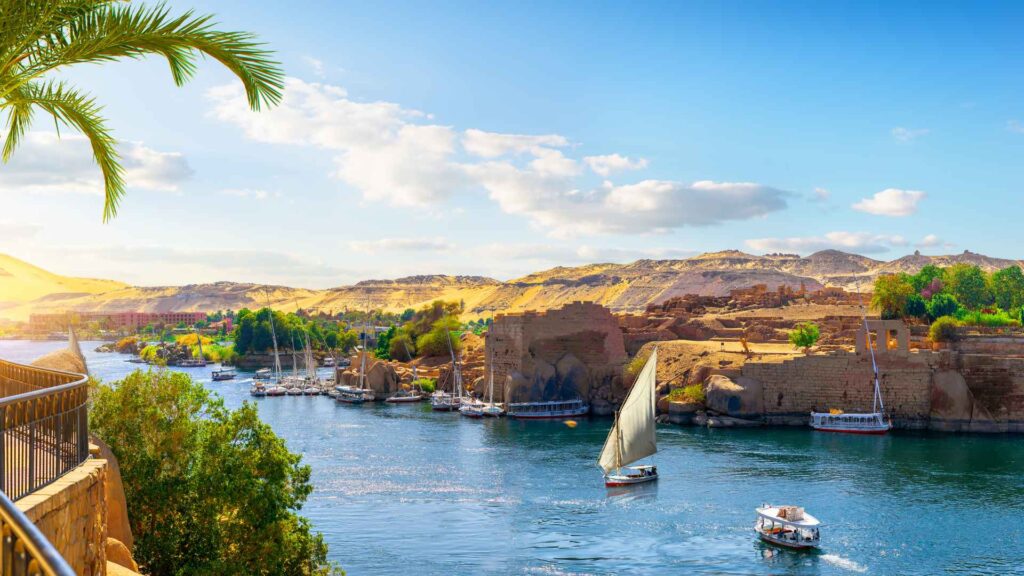
Cultural Etiquette and Local Customs
Aswan is part of a predominantly Muslim country, and understanding basic cultural norms ensures a respectful and smooth experience.
- Dress Code: Lightweight, loose-fitting clothing is ideal to combat the heat. While Western dress is generally accepted, it’s recommended to cover shoulders and knees, especially when visiting mosques or conservative areas.
- Greetings: A warm “Salaam alaikum” (peace be upon you) is always welcomed, and a handshake is common.
- Bargaining: Haggling in souks is part of the culture. Engage politely, keep a smile, and don’t feel pressured to buy if the price isn’t right.
- Photography: Ask for permission before photographing local people, especially in Nubian villages. Some sacred areas or museums may prohibit photography or charge an extra fee.
- Respect for Holy Sites: Remember to remove your shoes before entering mosques and dress modestly.
Adhering to these guidelines will pave the way for genuine interactions and experiences that go beyond the surface.
Incredible Things to Do in Aswan
Below, you’ll find a curated list of must-experience activities.
From legendary temples to secret local hangouts, Aswan offers an array of discoveries for every traveler. Take your time to savor each moment.
Explore the Temple of Philae
One of Aswan’s most iconic attractions, the Temple of Philae stands on Agilkia Island—a relocation project that saved the complex from inundation after the construction of the High Dam.
The temple, dedicated primarily to the goddess Isis, is a testament to ancient Egyptian architecture. Arrive by boat, wander through towering colonnades, and marvel at well-preserved carvings and hieroglyphs that tell timeless stories of devotion and power.
Marvel at the Unfinished Obelisk
Lying in its original quarry bed, the Unfinished Obelisk offers a rare glimpse into the stonemasonry techniques of ancient Egypt.
This massive granite piece, had it been completed, would have been the largest obelisk ever erected, towering at an estimated 42 meters.
Wander through the site to see evidence of ancient tool marks and learn about the challenges that led to the project’s abrupt abandonment.
Take a Scenic Felucca Ride
A visit to Aswan isn’t complete without sailing the Nile on a felucca.
These traditional sailboats glide gracefully across calm waters, offering panoramic views of Elephantine Island, Botanical Gardens, and lush riverbanks lined with palm trees.
Many felucca excursions include an onboard picnic or tea—an enchanting way to watch the sunset cast its warm glow over the water.
Walk through the Nubian Museum
Dedicated to preserving the region’s Nubian heritage, the Nubian Museum is a trove of artifacts and exhibits spanning thousands of years of history.
Visitors can explore displays of ancient pottery, jewelry, and traditional costumes, alongside models that illustrate Nubian architecture and the impact of the High Dam on local communities. It’s a perfect introduction to the vibrant Nubian culture that thrives in and around Aswan.
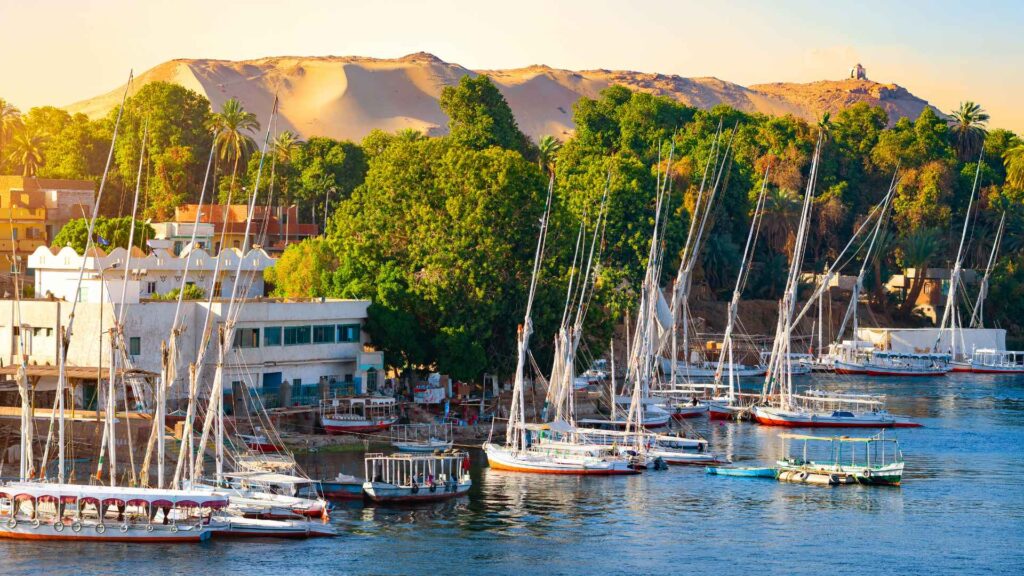
Wander Elephantine Island
Just a short boat ride from downtown Aswan, Elephantine Island is an archaeological wonder that once served as a crucial trading hub.
The island is home to the Temple of Khnum, the Temple of Satis, and the Nilometer, ancient structures used to measure Nile flood levels.
Today, it’s also home to colorful Nubian villages where you can meet friendly locals, sip on hibiscus tea, and immerse yourself in laid-back island life.
Visit a Traditional Nubian Village
For an unforgettable cultural immersion, head to one of the nearby Nubian villages—many are easily reached by boat.
Distinctive for their vividly painted homes and lively atmosphere, these villages are a feast for the senses.
From traditional henna tattoos to lively music and dance performances, you’ll come away with a deeper appreciation of Nubian heritage. Don’t forget to sample local delicacies like fresh bread, tangy cheeses, and spiced stews.
Stroll the Aswan Souk
A bustling marketplace brimming with color and energy, the Aswan Souk (market) stretches along several streets near the waterfront.
Vendors sell spices, handcrafted Nubian souvenirs, scarves, silver jewelry, and more.
Let the intoxicating aromas of cumin, cardamom, and hibiscus draw you deeper into the labyrinth. Bargain with a smile, embrace the lively banter, and treat yourself to something unique.
Bask in the Grandeur of Abu Simbel (Day Trip)
Though not in Aswan city proper, Abu Simbel is often visited from Aswan as a memorable day trip.
The colossal rock temples built by Ramses II—featuring four giant statues perched at the entrance—are an awe-inspiring sight.
Originally carved out of the mountainside, they were relocated in the 1960s to prevent flooding. Step inside to see hallways lined with elaborate carvings that celebrate the pharaoh’s victories and devotion to his queen, Nefertari.
Admire the Aswan High Dam
A modern engineering marvel, the Aswan High Dam fundamentally changed the landscape of Egypt by controlling Nile flooding and creating Lake Nasser, one of the world’s largest man-made lakes.
Standing atop the dam, you can gaze across this vast expanse of water and appreciate the historical significance of this project—one that displaced communities and required the relocation of grand temples like Abu Simbel and Philae.
Relax in Aswan Botanical Garden
Located on Kitchener’s Island, the Aswan Botanical Garden is accessible by motorboat or felucca.
This lush haven boasts exotic plants and tall palm trees from across the globe, introduced by Lord Kitchener in the 19th century.
Stroll along shaded pathways, pause at quiet benches overlooking the Nile, and let the fragrance of flowering shrubs rejuvenate your senses.
Sip Tea at the Old Cataract Hotel
Immortalized in Agatha Christie’s “Death on the Nile,” the Sofitel Legend Old Cataract Hotel exudes colonial-era luxury.
Even if you aren’t staying overnight, you can stop by for afternoon tea on the terrace, offering stunning views of the Nile and Elephantine Island. The hotel’s history is palpable: Winston Churchill and Tsar Nicholas II once roamed its elegant halls.
Discover St. Simeon Monastery
Venture across the Nile to visit the St. Simeon Monastery, an ancient Christian monastery that dates back to the 7th century (with later expansions in the 10th century).
The desert surroundings heighten the feeling of isolation and serenity. Inside the mud-brick walls, explore the remains of the church, monks’ cells, and storerooms, while admiring frescoes that have survived for centuries.
Experience a Sunset Camel Trek
You don’t have to travel far from Aswan’s center to enjoy a camel ride against the dramatic backdrop of golden dunes.
Local guides offer short treks near the West Bank, often timed to catch the sunset. It’s a tranquil experience—just you, the soft desert breeze, and the gentle sway of a camel stepping through the warm sand.
Take a Swim in the Nile
While not everyone’s cup of tea, a dip in the Nile—particularly in areas known to be safe and free of strong currents—can be incredibly refreshing.
Some felucca tours may offer stops for swimming, or certain hotels have designated Nile-access spots. The water is surprisingly cooler than you might expect in the desert climate, offering a rejuvenating respite from the heat.
Try a Local Cooking Class
Aswan’s cuisine is a mouthwatering blend of Egyptian and Nubian flavors, featuring ingredients like fava beans, freshly caught fish, and aromatic spices.
Joining a local cooking class lets you learn how to make dishes such as ful medames or a hearty tagine. Cooking side by side with local hosts is a wonderful way to bond over culinary traditions.
Hunt for Handicrafts at Aswan Artisans’ Workshops
Beyond the main souk, you can find small workshops specializing in wood carving, basket weaving, embroidery, and hand-painted ceramics.
Exploring these workshops is a chance to witness artisans at work, continuing family tradespassed down through generations. Pick up one-of-a-kind souvenirs that carry a piece of Aswan’s creative spirit back home with you.
Visit the Tombs of the Nobles
Lesser-known than the grand temples, the Tombs of the Nobles on the West Bank offer insight into the lives of high-ranking officials during the Old and Middle Kingdoms.
Climb a short path up the desert hills to explore ornate tomb chambers with painted walls depicting religious scenes and daily life. The hilltop also grants spectacular views of the Nile Valley below.
Explore the New Kalabsha Temple
Relocated after the construction of the High Dam, New Kalabsha comprises multiple ancient monuments, including the Temple of Kalabsha, the Kiosk of Qertassi, and the Temple of Beit el-Wali.
These sites are accessible by boat on Lake Nasser, and though less visited than Philae or Abu Simbel, they boast impressive reliefs and a peaceful atmosphere away from crowds.
Birdwatching along the Nile Banks
The Aswan region is a paradise for birdwatchers, with the Nile’s fertile edges attracting egrets, herons, kingfishers, and even migratory birds during certain seasons.
Stroll along the corniche or hire a felucca guide knowledgeable about local wildlife. Don’t forget your binoculars—you might spot something rare, especially in the early morning or late afternoon.
Savor a Night of Nubian Music and Dance
Aswan’s nightlife might not be as bustling as Cairo’s, but it has its own special charm. Many Nile cruise boats or hotels host Nubian cultural shows featuring live music, clapping rhythms, and mesmerizing dance performances in vibrant traditional costumes.
Dive into the festive atmosphere, and you may find yourself invited to join the dance circle, adding another layer to your Aswan memories.
Savoring Aswan’s Culinary Delights
Food in Aswan caters to a variety of tastes, from authentic Egyptian staples to continental cuisine found in upscale hotels. Some not-to-miss flavors include:
- Ful Medames: Stewed fava beans seasoned with garlic, lemon, and cumin, often eaten for breakfast.
- Ta’ameya (Falafel): Made from ground fava beans instead of chickpeas, giving them a distinctly Egyptian twist.
- Koshari: A carb-lover’s dream—rice, pasta, lentils, and chickpeas topped with tangy tomato sauce and crispy onions.
- Hibiscus Tea (Karkadeh): Served hot or cold, this brilliantly crimson tea is both refreshing and tart.
- Fresh Grilled Fish: Sourced directly from the Nile or Lake Nasser, often seasoned with aromatic spices and herbs.
Scour the local markets for fresh produce, or venture into neighborhood bakeries for flatbreads and pastries. Whether you’re dining in a chic restaurant or tasting street food from a local vendor, Aswan’s culinary scene will keep you satisfied.
Accommodation Options
While many visitors arrive by cruise ship, Aswan also offers accommodations for longer stays:
- Luxury Hotels: Resorts like the Sofitel Legend Old Cataract promise high-end comfort, historic ambiance, and stunning views of the Nile.
- Mid-Range Hotels: Properties along the corniche provide clean rooms, river views, and easy access to major attractions.
- Budget Guesthouses: For those seeking an authentic experience, consider staying at a Nubian guesthouse on Elephantine Island or near the West Bank. Expect simple but cozy rooms, warm hospitality, and homemade Nubian meals.
Regardless of where you stay, you’ll be greeted with typical Egyptian warmth and a laid-back vibe that distinguishes Aswan from bustling cities like Cairo.
Safety and Practical Tips
- Heat Precautions: Aswan can be sweltering, especially between May and September. Wear sunscreen, stay hydrated, and schedule outdoor activities in the early morning or late afternoon.
- Money Matters: The Egyptian Pound (EGP) is the local currency. Many vendors accept cash only, but some tourist-oriented businesses may accept credit cards or foreign currency at less favorable rates.
- Tipping: Known locally as “baksheesh,” tipping is customary in Egypt. Small amounts are often expected for services—drivers, guides, and even restroom attendants in tourist areas.
- Personal Safety: Aswan is generally safe, but stay alert in crowded areas to avoid pickpockets. Keep valuables in a secure place, and consider using a money belt if you’re carrying large sums of cash.
- Language: Arabic is the official language, but English is widely spoken in tourist areas. Learning a few Arabic phrases can help you connect with locals on a deeper level.
- Guided Tours: Hiring a local guide can be immensely helpful for understanding the rich history behind each site. Guides can also facilitate smoother entry into attractions and handle language barriers.
Beyond the Port: Day Trips and Extensions
- Kom Ombo and Edfu: Situated between Aswan and Luxor, these two temples are regular stops on Nile cruise itineraries but can be visited by road or rail if you’re extending your stay.
- Lake Nasser Cruises: Board a separate cruise that traverses Lake Nasser, stopping at remote temples like Amada, Derr, and Wadi El Seboua.
- Desert Excursions: The surrounding desert offers opportunities for off-road safaris, stargazing under clear skies, and camping with a traditional Bedouin experience.
Embracing the Spirit of Aswan
What sets Aswan apart is its unhurried pace and the genuine warmth of its people.
The city invites you to stroll leisurely along the corniche, linger over cups of mint tea, and strike up conversations with locals eager to share stories of their heritage.
You’ll notice how the water and the desert form an eternal dance—the Nile providing life-giving sustenance, and the sands preserving the remnants of lost civilizations.
A crucial aspect of Aswan’s charm is the melting pot of cultures—from ancient Egyptians and Romans to modern-day Nubians and Arab Egyptians, each contributing to the city’s diversity.
Even though Aswan has become a vibrant tourist destination, you’ll still find hidden corners untouched by large crowds, where the call to prayer echoes across the water at sunrise and donkey carts roll through narrow lanes unhurriedly.
Insider Tips for an Unforgettable Experience
- Dawn Visits: Beat the midday heat and throngs of tourists by arriving at sites like Philae Temple right at opening time. Mornings in Aswan are magical, with soft light and cooler temperatures.
- Evening Light Shows: Many temples, including Philae, host sound-and-light shows after dark. These performances can add an ethereal layer to your historical immersion.
- Local Festivals: If you’re in town for Moulid celebrations (saints’ feast days) or national holidays, you’ll witness Aswan’s streets come alive with music, parades, and fireworks.
- DIY Island Hopping: If you’re feeling adventurous, negotiate with a felucca captain or motorboat driver to create a custom island-hopping tour. Elephantine, Kitchener’s Island, and lesser-known islets each have their own charm.
- Combine with Luxor: Aswan is often paired with Luxor, another treasure trove of ancient monuments. Whether by train, road, or cruise, continuing your journey to Luxor (or vice versa) enriches your understanding of the Nile’s significance throughout Egyptian history.
Bringing Home a Piece of Aswan
It’s not just memories you’ll take with you—Aswan offers plenty of beautiful mementos:
- Handwoven Scarves: Vibrant cotton or wool shawls in Nubian designs.
- Spices: From saffron and turmeric to Egyptian mixes like dukkah—these aroma-filled souvenirs transport you back to Aswan every time you cook.
- Alabaster Figurines: Intricately carved statues or vases depicting Egyptian deities or pharaonic motifs.
- Papyrus Art: Painted scenes of hieroglyphs or iconic deities on genuine papyrus paper.
- Nubian Jewelry: Bold designs incorporating shells, beads, and silver.
Wherever you shop, support local artisans. Not only do you get an authentic product, but you also help sustain traditional crafts in the region.
